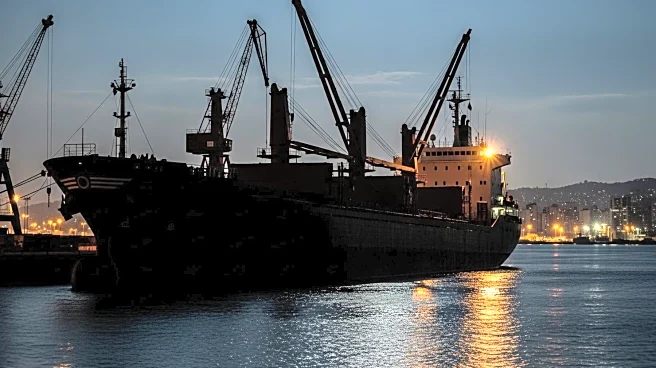What is the story about?
What's Happening?
An Iranian vessel, the Delruba, has reportedly offloaded a cargo of fertilizer at a port in the Brazilian state of Santa Catarina, marking a violation of U.S. sanctions on Iran's industrial enterprises. The Delruba, which is blacklisted under U.S. secondary sanctions, is said to be carrying urea made from Iranian natural gas. These sanctions target Iranian state-owned companies and the country's oil and gas industry. The vessel's activities were first reported by conservative investigative journalist Claudio Dantas, who sourced customs documents indicating the shipment originated from Pardis Petrochemical, a company under U.S. sanctions. Despite its sanctioned status, the Delruba openly declared its voyage from Asaluyeh anchorage in Iran to Brazil, flying the Iranian flag.
Why It's Important?
The incident highlights the complexities and challenges of enforcing international sanctions, particularly when countries like Brazil maintain diplomatic relations with sanctioned states such as Iran. The Delruba's activities could strain U.S.-Brazil relations, as engaging with sanctioned entities risks serious penalties, including being added to the U.S. sanctions list. This situation underscores the geopolitical tensions surrounding Iran and the implications for global trade, especially in sectors like fertilizer, where Brazil is heavily reliant on imports. The event also reflects Brazil's strategic decisions under President Ignacio Lula da Silva, who has previously allowed Iranian naval vessels to dock in Brazilian ports, indicating a potential diplomatic stance that could affect international relations.
What's Next?
The Delruba's presence in Brazil may prompt diplomatic discussions or actions from the U.S., potentially leading to increased scrutiny of Brazil's trade practices with Iran. Brazil's dependency on fertilizer imports could drive further negotiations or policy adjustments to balance economic needs with international diplomatic pressures. Additionally, the planned restart of Petrobras' nitrogen fertilizer complex in Parana next year may reduce Brazil's reliance on foreign suppliers, potentially altering its import strategies and diplomatic engagements.
Beyond the Headlines
The situation raises ethical and legal questions about the enforcement of international sanctions and the responsibilities of countries in adhering to global norms. Brazil's actions could set a precedent for other nations in managing relations with sanctioned states, influencing global diplomatic and trade policies. The incident also highlights the broader implications of geopolitical alliances and their impact on international trade dynamics.
















